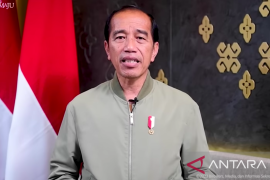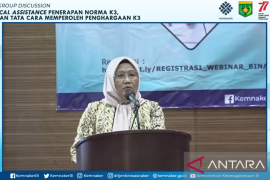Kadin has said it is opposed to the content of the draft bill because it would burden the industry and raise the cost of employment.Jakarta (ANTARA News) - In efforts to resolve the issue of housing backlog, the government and the House are deliberating a public housing savings bill that will serve as a legal basis for the people to find access to savings to own houses.
However, businesses grouped in the Indonesian Chamber Commerce and Industry (Kadin) and in the Indonesian Employers Association (Apindo) have objected to the content of the Bill on Savings for Public Housing (Tapera bill), claiming that if the draft bill is passed into law, it will put further burden on employers.
Therefore, the Kadin has said it is opposed to the content of the draft bill because it would burden the industry and raise the cost of employment.
"Kadin appreciates the purpose of the Tapera bill which aims to give a chance to low-income people to own houses but we have also objected to the content of the bill because it puts the burden of funding the savings scheme on the shoulders of the employers," Chairman of Kadin Indonesia, Rosan P Roeslani, said in press statement in Jakarta on Tuesday.
He said that employers have been burdened with the requirement to set aside a fund of some 10.24 to 11.74 percent of workers monthly salaries for health and workers social security (savings for old-age, life, occupational accident, retirement) and severance pay reserves, which, according to the calculation of actuaries, reached 8 percent.
According to Rosan, if the Tapera bill continued to be implemented, it should be designed for low-income people and informal workers who have joined the Workers Social Security Management Agency (BPJS Ketenagakejaan) whose funding sources could be the State Budget-Regional Budget (APBN-APBD), or other funding sources from taxes.
"After all, official workers have become participants of the BPJS Ketenagakerjaan and can access savings from the housing program based on Government Regulation (PP) No.99/2013 and PP No. 55/2015 on Workers Social Security Asset Management," the Kadin chairman said.
Earlier, the Indonesian Employers Association (Apindo) also expressed its opposition to the content of the draft bill on savings for public housing. It said it was opposed to the Tapera bill because the funding sources of the scheme were employers.
"We will take legal steps and will ignore it if the bill is endorsed," Apindo General Chairman Hariyadi B Sukamdani told a press conference on Tuesday (Jan 19).
Apindo, said Hariyadi Sukamdani, respected the aim of the bill to enable the low-income people to own houses. However, Apindo will firmly reject it if it is passed into a law, keeping companies as the source of funding of the housing saving scheme.
He argued that the association is opposed to the bill owing to several matters. Among these is the fact that the burden borne by employers and workers had been very high. Any additional burden, no matter how much, would make businesses competitiveness even less.
Based on the Apindo data, the employers were being asked to bear a burden equal to about 18-19 percent of the workers monthly income. This money is to be used to take care of savings for old-age, life, occupational accident, retirement, health and severance pay reserves.
In addition, the workers wages in the past five years have increased by about 14 percent, and based on the Apindo data, the annual burden of the employers could reach up to 35 percent.
In the current draft of the Tapera bill, the government makes it mandatory for companies to deduct 3 percent of their employees salaries, of which 2.5 percent will be borne by employees and 0.5 percent paid by employers, for savings for the housing fund.
Under the BPJS Ketenagakerjaan scheme, employees are required to set aside 5.7 percent of their monthly salary for their retirement, of which 3.7 percent is paid by the company and 2 percent by the workers.
"Both Apindo and Kadin have officially rejected the bill because we see overlap with the BPJS," Kadin chairman Rosan P. Roeslani said.
The House of Representatives (DPR) is expected to enact into law the Tapera bill in the near future, a legislator said.
"The draft law is still under deliberations but 85 percent of the work on it has been completed," Mukhammad Misbakhun, the deputy chairman of the special committee for drafting the law, said at the Parliament building on Tuesday.
He said that the deliberations on main substance of the draft law, based on an inventory list, had been completed. What remains to be done, according to Mukhammad, was the final touch to be given by the formulating team.
The expeditious deliberations on the public housing saving bill is proof of President Joko Widodos (Jokowis) courage to ensure that the peoples needs for housing are fulfilled.
"This draft law was deliberated by the DPR in its previous term but it was not completed and the term of the House had come to an end," he said.
Mukhammad, who is also a politician of the Golkar Party, added that the current 2014-2019 DPR term was different from its previous avatar and the deliberations on the bill proceeded in a relatively smooth manner.
Under the Jokowi government, the House was optimistic to complete its work on the public housing saving bill and endorse it into a law.
"This is the governments commitment to help the people own houses," he said.
He said the House has set a target of one month to turn the bill into a law.
"The bill will provide a legal basis for collecting and providing long term funds for financing housing for the people," he said.(*)
Reporter: Andi Abdussalam
Editor: Heru Purwanto
Copyright © ANTARA 2016











